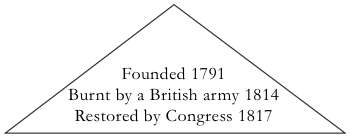Thomas Jefferson to James Monroe, 16 October 1816
To James Monroe
Monticello Oct. 16. 16
[D]ear Sir
If it be proposed to place an inscription on the Capitol, the lapidary style requires that essential facts only should be stated, and these with a brevity admitting no superfluous word. the essential facts in the two inscriptions proposed are these
 the reasons for this brevity are that the letters must be of extraordinary magnitude to be read from below; that little space is allowed them, being usually put into a pediment or in a frize, or on a small tablet on the wall; and, in our case a 3d reason may be added, that no passion can be imputed to this inscription, every word being justifiable from the most classical examples.
the reasons for this brevity are that the letters must be of extraordinary magnitude to be read from below; that little space is allowed them, being usually put into a pediment or in a frize, or on a small tablet on the wall; and, in our case a 3d reason may be added, that no passion can be imputed to this inscription, every word being justifiable from the most classical examples.
But a question of more importance is Whether there should be on[e]1 at all? the barbarism of the conflagration will immortalise that of the nation[.] it will place them for ever in degraded comparison with the execrated Bonaparte who, in possession of almost every capital in Europe, injured no one. of this, history will take care, which all will read, while our inscription will be seen by few. Great Britain, in her pride and ascendan[cy] has certainly hated and despised us beyond every earthly object. her hatred may remain,2 but the hour of her contempt is past; and is succeede[d] by dread; not a present, but a distant and deep one. it is the greater, a[s] she feels herself plunged into an abyss of ruin from which no human mea[ns] point out an issue. we also have more reason to hate her than any nati[on] on earth. but she is not now an object for hatred. she is falling from h[er] transcendant sphere, which all men ought to have wished; but not th[at] she should lose all place among nations. it is for the interest of all tha[t] she should be maintained nearly on a par with other members of th[e] republic of nations. her power, absorbed into that of any other, would [be] an object of dread to all; and to us more than all, because we are accessible to her alone, and thro’ her alone. the armies of Bonaparte, with the fleets of Britain, would change the aspect of our destinies. Under these prospects, should we perpetuate hatred against her? should we not on the contrary begin to open ourselves to other, and more rational dispositions? it is not improbable that the circumstances of the war, and her own circumstances may have brought her wise men to begin to view us with other, and even with kindred eyes. should not our wise men then, lifted above the passions of the ordinary citizen, begin to contemplate what will be the interests of our country, on so important a change among the elements which influence it? I think it would be better to give her time to shew her present temper, and to prepare the minds of our citizens for a corresponding change, of disposition, by acts of comity towards England, rather than by commemorations of hatred. these views might be greatly extended. perhaps however they are premature, and that I may see the ruin of England nearer than it really is. this will be matter of consideration with those to whose councils we have committed ourselves, and whose wisdom, I am sure, will conclude on what is best. perhaps they may let it go off on the single and short consideration that the thing can do no good, and may do harm. ever & affectionately yours.
Th: Jefferson
PoC (DLC); salutation faint and edge frayed; at foot of first page: “The Secretary of State.”
No inscription was ultimately placed in or on the United States capitol to commemorate its destruction by British forces during the War of 1812.
1. Word faint.
2. Reworked from “hatred remains.”
Index Entries
- Capitol, U.S.; and War of1812 search
- Capitol, U.S.; construction and repair of search
- Great Britain; peace with search
- Great Britain; TJ on war with search
- Jefferson, Thomas; Opinions on; British destruction in Washington search
- Jefferson, Thomas; Opinions on; Great Britain search
- Jefferson, Thomas; Opinions on; inscription for U.S. Capitol search
- Jefferson, Thomas; Opinions on; Napoleon search
- Jefferson, Thomas; Opinions on; peace with Great Britain search
- Jefferson, Thomas; Opinions on; war with Great Britain search
- Monroe, James; and proposed inscription for U.S. Capitol search
- Monroe, James; letters to search
- Napoleon I, emperor of France; mentioned search
- Napoleon I, emperor of France; TJ on search
- War of1812; British destruction in Washington search
- Washington, D.C.; British destruction in search

![University of Virginia Press [link will open in a new window] University of Virginia Press](/lib/media/rotunda-white-on-blue.png)
